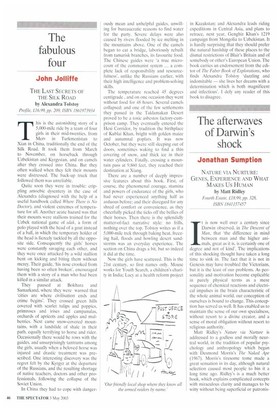The fabulous four
John Jolliffe
THE LAST SECRETS OF THE SILK ROAD by Alexandra Tolstoy Profile, ,f16.99, pp. 209, ISBN 1861973934 This is the astonishing story of a 5,000-mile ride by a team of four girls in their mid-twenties. from Mery in Turkmenistan to Xian in China, traditionally the end of the Silk Road. It took them from March to November, on horseback through Uzbekistan and Kyrgystan, and on camels after they crossed into China. But they often walked when they felt their mounts were distressed. The back-up truck that followed them was unreliable.
Quite soon they were in trouble: crippling amoebic dysentery in the case of Alexandra (diagnosed with the help of a useful handbook called Where There is No Doctor), and violent extremes of temperature for all. Another acute hazard was that their mounts were stallions trained for the Uzbek national game of ulak, a form of polo played with the head of a goat instead of a ball, in which the temporary holder of the head is fiercely tackled by all the opposite side. Consequently the girls' horses were constantly savaging each other, and they were once attacked by a wild stallion bent on kicking and biting them without mercy. Their guide, 'his nose crooked from having been so often broken', encouraged them with a story of a man who had been killed in a similar attack.
They paused at Bokhara and Samarkand, where they were warned that 'cities are where civilisation ends and crime begins'. They crossed green hills covered with scarlet tulips and poppies, primroses and irises and campanulas, orchards of apricots and apples and mulberries. Next came snow-covered mountains, with a landslide of shale in their path, equally terrifying to horse and rider. Occasionally there would be rows with the guides, and unsurprisingly tantrums among the girls, usually when a beloved horse was injured and drastic treatment was prescribed. One interesting discovery was the regret felt by the Kyrgyz at the departure of the Russians, and the resulting shortage of native teachers, doctors and other professionals, following the collapse of the Soviet Union.
In China they had to cope with danger
ously mean and unhelpful guides, unwilling for bureaucratic reasons to find water for the party, Severe delays were also caused by rivers flooded by ice melting in the mountains above. One of the camels began to eat a bridge, laboriously rebuilt from tamarisk branches, its favourite food. The Chinese guides were 'a true microcosm of the communist system ... a complete lack of responsibility and resourcefulness', unlike the Russians earlier, with their high intelligence and problem-solving skills.
The temperature reached 45 degrees centigrade , and on one occasion they went without food for 48 hours. Several camels collapsed; and one of the few settlements they passed in the Taklamakan Desert proved to be a toxic asbestos factory-cumprison camp. They eventually entered the Hexi Corridor, by tradition the birthplace of Kublai Khan, bright with golden maize and autumnal poplars. It was now October, but they were still sleeping out of doors, sometimes waking to find a thin covering of snow, and thick ice in their water cylinders. Finally, crossing a mountain pass at 9,860 feet, they reached their destination at Xiang.
There are a number of deeply impressive features about this book. First, of course, the phenomenal courage, stamina and powers of endurance of the girls, who had never experienced anything half as arduous before; and their disregard for any shred of comfort or convenience, as they cheerfully picked the ticks off the bellies of their horses. Then there is the splendidly matter-of-fact narrative style: no frills, nothing over the top. Tolstoy writes as if a 5,000-mile trek through baking heat, freezing hail, floods and howling desert sandstorms was an everyday experience. The section on China drags a bit, but so indeed it did at the time.
Now the girls have scattered. This is the 21st century, so first names only. Mouse works for Youth Search, a children's charity in India; Lucy at a health reform project in Kazakstan; and Alexandra leads riding expeditions in Central Asia, and plans to retrace, next year, Genghiz Khan's 1219 campaign from Mongolia to Uzbekistan. It is hardly surprising that they should prefer the natural hardship of these places to the dismal restrictions of Blair's Britain and of somebody or other's European Union. The book carries an endorsement from the editor of The Faber Book of Explorations, who finds Alexandra Tolstoy 'dazzling and indomitable — she lives her dreams with a determination which is both magnificent and infectious'. I defy any reader of this book to disagree.










































































 Previous page
Previous page